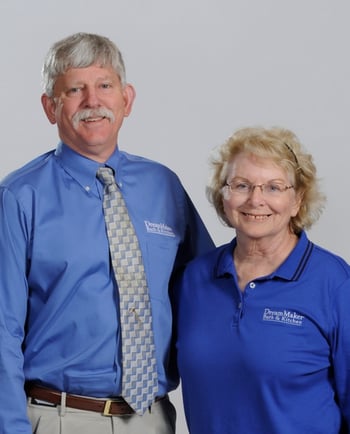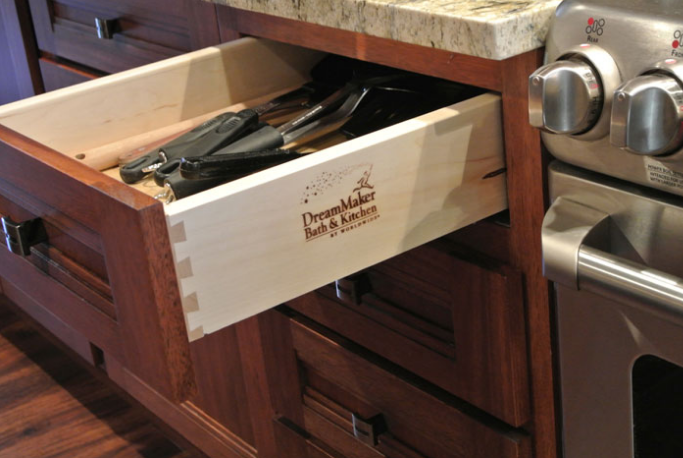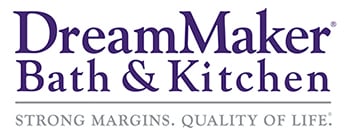Glen Borkowski explains why a successful remodeler would want to join a franchise
 Glen and Denise Borkowski
Glen and Denise Borkowski
Glen Borkowski was skeptical of joining the DreamMaker remodeling franchise, but he had been struggling with marketing his remodeling business and maintaining decent profit margins while competing for work. So when DreamMaker left him a message, he decided to call back. What he learned about the business convinced him to join the franchise in 2008.
This is his story.
What were you doing before DreamMaker?
At first I was a teacher, but in the 1980s, enrollment was dropping in Chicago schools. School districts were having to lay off teachers, and since I was just starting out, I was always one of the lowest guys on the seniority level. I taught in a different school district every single year, and I was ready to do something else. I was seriously dating the lady I’m now married to (Denise, recently named DreamMaker’s Woman of the Year), and we couldn’t buy a house because every year I was teaching in a different place! I decided I was going to be the captain of my own ship.
My grandfather was a home-builder. Growing up, I would spend a lot of time with him during the summer, and it was really cool when I was 4 or 5 years old and he would show me how to use different tools. My father was in the wholesale plumbing industry. He wasn’t a licensed plumber, but he taught at a trade school and had really strong journeyman-level skills, so whenever a relative would buy an old bungalow in the city, we would go rip the guts out of it and replace the pipes. At a tender age, I learned how to solder and work with my hands. During college — and even for summer jobs while I was teaching — I would do projects like building bookshelves.
I enjoyed it and figured a remodeling business would allow me to scratch my creative itch. I enjoy problem-solving and being challenged. I don’t think I could work in new home construction, doing the same thing again and again. With remodeling, you have to deconstruct and put something nice back together without affecting the rest of the house. I like driving home and thinking about what we have to do tomorrow, and thinking through how we are going to do it.
What was the advantage of becoming part of DreamMaker?
The two biggest reasons I joined were I wanted to tap into DreamMaker’s marketing department, and I wanted to be able to take advantage of wholesale prices for materials.
I’m not a marketing specialist. I knew what it took for me, in time and energy, to constantly put together marketing ideas for my business, whether that was making print ads, hiring a photographer, finding a homeowner who would let me photograph their project or putting together a direct mail piece. It was agonizing, and it’s not what I’m trained to do. It drained a lot of energy. We preach to prospective clients that they want to hire professionals because they’ll get a much better result. The same thing is true for marketing. DreamMaker has a marketing department with trained people who obviously will do a better job than I. They have created a wealth of marketing pieces that we can access online, and with a couple of strokes of the keyboard, you can order custom pieces and have direct mail sent out.
The other biggie was the fact we can buy directly from manufacturers now. Before, we always had to find a middleman distributor, especially for cabinetry, and that was a huge problem for us. A lot of the middlemen would promise us the sun, the moon and the stars, but deliver a miserable experience. Then, we had to pay that middleman, which meant we wound up paying about the same as a homeowner would have paid if they bought the cabinets themselves. We either had to give the cabinets away, or if we tried to mark them up at all, we had to price ourselves higher than the competition. Now, thanks to DreamMaker, we can earn good margins on the cabinets.
 DreamMaker Bath & Kitchen helps remodeling franchise owners buy supplies directly from manufacturers. We also provide strong marketing tools and guidance for franchisees.
DreamMaker Bath & Kitchen helps remodeling franchise owners buy supplies directly from manufacturers. We also provide strong marketing tools and guidance for franchisees.
How did you find out about DreamMaker?
I got to know DreamMaker at remodeling conventions. When I first noticed them, they were focused on tub liners, which didn’t appeal to me. But year after year, I could see them coming up in the rearview mirror. (DreamMaker President and Chief Stewardship Officer) Doug Dwyer took over and slowly transformed it into a full-service kitchen and bath company. One day they called and left me a message, and quite frankly, I didn’t return it for at least a week. One day I had nothing going on, and I decided to call and see what it was all about.
What piqued your interest?
More than anything, it was their sales method, which was extremely casual — no pressure whatsoever. You’re so geared up, you know these people want to sell you something, and I don’t like to be attacked by a salesperson. I like to gather information and make my decision, and their approach was just that. It was very low-key. They would schedule a call once a week, they would ask what information I wanted, and they would get it to me. My recruiter would tell me whenever we talked: “Keep digging, keep looking for the Achilles’ heel, because if you’re not 100 percent sure you want to do this, we don’t want you to do it.” They also said: “We’re going to tell you ‘yes’ or ‘no’ before you tell us ‘yes’ or ‘no.’ ” It wasn’t just about me ponying up the money to start the franchise.
When I was considering DreamMaker, I talked to a lot of its franchisees. Most of them had very similar backgrounds: They had a family business, or their parents had started it, and suddenly they decided to join a franchise. And my question was simple: Why do that? Why give some of your money away? One of the franchises I spoke to, he and his wife had won a number of design awards over the years and I asked them, “Why are you doing this?” They were very forthcoming with information and what the benefits were. And that was true of everyone I called. I wasn’t hearing anything negative, so at one point I asked DreamMaker for names and numbers of franchises that had failed. They said, “OK, it will take us a little while to go through legal compliance and to contact these people,” and they produced some names for me to call. Even those people said it just didn’t work; they didn’t have anything bad to say about DreamMaker or the team. That made me feel really good, because you can easily see where, even if it was the fault of the franchise owner that the business didn’t work, they could point a finger at the franchisor. I got a really strong feeling the corporate team members were really stand-up people who gave you what they promised.
What do you like about the work you do?
We don’t get too many cookie-cutter jobs. What I enjoy the most is figuring out what will be the best solution for each individual client. Everyone has a different story. The thing that gives me the most satisfaction is figuring out what’s the best solution for the customer, giving them the best value, giving them the most pleasure. It’s not about what worked best for our last five clients, it’s about them as an individual.
What sets DreamMaker apart?
We ask a lot of people that question after the projects are over, and they like the fact we are a local business with a local presence, and that we have a Design Center so they know where they can find us. We’re not just Pickup Truck Chuck driving around with a cell phone, a business card and a P.O. Box for an address. Also, the truck is very recognizable, and they see us driving around the neighborhood.
Is that how most customers find you?
Now, more and more people just Google “kitchen remodeling” or “bath remodeling” and that’s how they find us, so the website we have, thanks to DreamMaker, is a very valuable tool. The great majority of people are going to our website long before they ever contact us. People like to do their own research. Maybe 80 percent of the sales process, in the customer’s mind, is already completed because they have looked through the website.
What do customers like about the DreamMaker process?
I think people feel we have a higher level of professionalism. We try to educate people and give them information about all the services we provide, from design to coordination of all aspects of the remodel. It’s a complete service. We also don’t just dive in and start selecting products. We take time to understand the client, what they want, and create a well-thought-out plan. You know, you can use another remodeler and get a new kitchen, and for the first 12 months, you’ll be happy, but then 12 months later, they’ll turn to their husband and say, “I’m glad we did this, but I wish we had done a couple of things differently. This isn’t exactly what we needed.” That’s something we don’t hear from clients. Instead, they tell us later that it’s clearer to them how well-designed the projects are, and I get thanks for steering them in a direction that would tailor the room to their needs.
 Clear branding and professionalism helps DreamMaker remodeling franchises stand out.
Clear branding and professionalism helps DreamMaker remodeling franchises stand out.
How did you weather the economic downturn that started in 2008?
Large kitchen projects used to be the real bread and butter of our business, but those projects just disappeared during the recession. We have done many, many more bathrooms than kitchens during the recession and recovery, and kitchens are just now starting to make a comeback. Kitchens are a larger-ticket job, and when people aren’t confident or can’t borrow money, they look for less-expensive projects. Had it not been for DreamMaker and some of its systems and rules in place, we would be gone. The recession hit us late; 2008 was still a good year, and we had enough in the pipeline to do OK in 2009. But 2010 and 2011 were a train wreck. Fortunately, DreamMaker insists on franchise owners maintaining a line of credit, which is something we never did when we were independent. We relied on a rainy-day fund, but the recession wiped that out. If we hadn’t had that line of credit to tap into, we’d be gone. It wasn’t very pleasant going into hock, but it got us through, and we were able to pay it off. Now we’re enjoying a very solid recovery.
Has DreamMaker helped you improve your gross profit margins?
Definitely. There’s the margins we now get from cabinets, of course. The marketing helps you get more leads in the first place. They are also big proponents of systematizing everything, which helps prevent slippage on each job that can cut into profit margins. Proprietary software allows you to put together an accurate estimate in much less time. By implementing these systems into your business, you become much more efficient, which helps you grow both revenues and profit margins.
We’re at a point now we can hire back some of the staff we had to let go during the recession. That’s something DreamMaker encourages, because they want us to have a good quality of life. The burnout rate, and the divorce rate, is high in this industry because so many people are working almost every waking hour. The stronger profit margins allow you to work 40-45 hours a week, not 70 hours a week, and still make more money. I have a grandson who spends time with me on the weekends, and I have time for that. There are a lot of other franchises that seem completely focused on moving up the next rung on the revenue ladder. You never hear from them about backing off and spending more time with your family. DreamMaker is not like that at all. When DreamMaker members talk about strong margins and quality of life, they really mean it.




